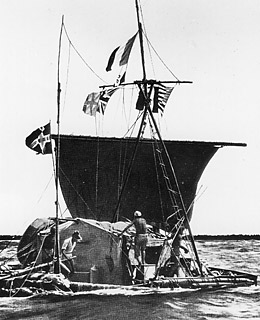
In 1947, Norwegian anthropologist Thor Heyerdahl built a primitive raft made of balsa logs lashed together by hemp rope, and set out from Callao, Peru, on a voyage across the Pacific. His mission: to prove that natives in South America could have settled in Polynesia well before the time of Christopher Columbus by sailing on primitive rafts. Overcoming a lifelong fear of water, Heyerdahl and a crew of five piloted the makeshift Kon-Tiki for an astonishing 101 days, sailing 4,300 miles (6,920 km) through fierce storms and sharks before running aground on a Polynesian reef. Heyerdahl's book about the adventure became an international best seller, the story of a man willing to risk his life to prove a point.